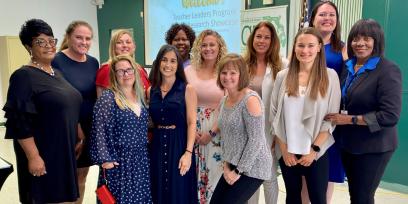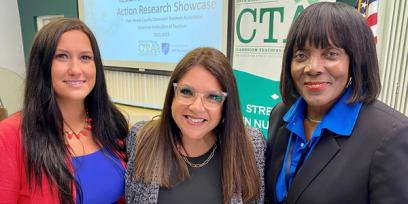Picture this: You’re an elementary school teacher required by your state to be certified in teaching reading because, well, learning to read is foundational to other learning and so is a large part of your job. Across town, a high school colleague also teaches reading—but to teenagers reading below grade level—and has the same reading certification but receives an extra stipend for it. Same certification, different pay.
When Florida teacher Rhonda Kunda discovered this, she decided that the unequal pay scale needed to change. As a participant in the AFT Teacher Leaders Program, which trains members to initiate improvements in their school communities, she researched this practice and presented her data analysis―along with a solution―to the local school board and her union’s executive board. Today, teachers with a “reading endorsement” certification in the district, regardless of grade level, receive the same stipend. Her leadership has benefited her colleagues and, by extension, their students.
But Kunda’s leadership is not unusual for alumni of this program. In addition to her success with reading certification stipends, here’s what her local union, the AFT-affiliated Palm Beach County Classroom Teachers Association, has accomplished in only five years:
- All ESE (exceptional student education) teachers receive an extra stipend for their work teaching students with disabilities, thanks to research conducted by teacher leaders Angelina Gallesi-Schmitt, Hazel McFarlane and Karen McFarlane.
- Professional development is now available in Spanish. A team of teachers trained to administer a test prep course (required for state licensure) translated the course so that native Spanish-language teachers, who comprise 16 percent of county teachers, could take it in Spanish.
- Because some teachers began their careers using chalkboards and paper planners while new ones start out their careers using Jamboard and Google Classroom, the union now offers professional development in different types of educational technology at different levels.
- Originally new teachers—and now all teachers—can participate in an Early Career Learning Lab, a mentoring program aimed at keeping them in the profession.
- One teacher leader, Cori Walls, created “Steve’s Club” for grieving students. Because her dad died when she was young, Walls designed the club to support children who have lost a parent. Students can talk about whatever they need, even if they’re angry or upset, without worrying that the adult won’t understand. What began as one teacher supporting her traumatized students now has community backing. The club has spread to five schools, along with hopes of expanding further. And it made national news.
A trajectory of professional growth
The local union’s professional development coordinator, Brianna Koch, holds the records and institutional memory of her affiliate’s involvement in the AFT’s national Teacher Leaders Program.
Koch started as a teacher leader more than five years ago, initially serving as a school building representative and the following year more actively as a facilitator, reaching out to the community and forming partnerships.
When she first volunteered for the program as an elementary special needs teacher, Koch had no idea where it would lead. She figured that her research project on mentoring new teachers would be the end of her involvement in the program, aside from occasional advocacy for mentoring. To her surprise, she became the local program’s co-facilitator, then lead facilitator, and now she heads up the union’s professional development across Palm Beach County.
That’s a long way since her days working at Forest Hill Elementary School, where she taught grades K-5 in a self-contained classroom, first for students with autism and then for kids with emotional and behavioral disorders. Koch worked in the classroom 10 years. Now she works in a partnership between the school district and her union in which the district pays her salary and the union pays for professional development trainers to facilitate the courses.
Koch hires the trainers, serves as a liaison and makes sure the course is rolled out properly. It’s a great collaboration, and the district fully supports it. “I’m really that person who’s able to keep that main connection throughout the school year,” she says. “It’s a good connection.”
Each year, Koch brings in a new co-facilitator, helps further their leadership and guides them into becoming trainers. Today, her affiliate has about 40 trainers, each of whom started as a teacher and became a union leader.
“Many teachers join the program because they’re not given any leadership opportunities at their school or in the district,” Koch says. “This gives them opportunities to grow professionally.”
In Florida, if you’re in the military or are a spouse of a service member, you can be hired to teach—with few, if any, credentials and no knowledge of pedagogy, Koch says. The school districts provide teaching coaches, but they’re not enough. So, she obtained a grant to provide virtual coaching for teachers who receive more grounding in the profession and in-service points to renew their teaching certificates. They also get a chance to absorb the core values of our union, Koch says. They feel supported.
Finally, teacher leaders are behind a key method of getting problems solved. Each school has instituted an Employee Building Council, an anonymous way to submit concerns. It works like a suggestion box. The issue at hand can be anything related to the school building: morning arrival, how trash is put out or whether a room is cold. It may concern school policies or the union contract. Beginning with a leader’s can-do mindset of “these are things that I can fix within my school,” teachers and other school employees drive the process.
If the principal meets with the council and the problem remains unresolved, only at that point does the council bring it to the union. When done correctly, the council’s work anonymizes problems and spreads out the responsibility. It is what AFT leaders call solution-driven unionism.
This kind of leadership isn’t unique to southeastern Florida. Of 24 AFT locals that took part in the 2022-23 leadership program nationwide, 23 are highly experienced in cultivating local leaders. With their newfound knowledge, teacher leaders move into a variety of union roles, including building representatives, union officers, committee chairs and program coordinators—even labor relations consultants. Some locals with labor-management partnerships share these leaders with the district. Some members, like Kunda, become teacher leader facilitators.
Along with the Teacher Leaders Program, professional learning is one of many resources the AFT offers members. Teachers can earn professional development points to renew their teaching certificate. In fact, all kinds of educators and instructional support staff have used the program to grow within the union.
No sunshine in the Sunshine State
That’s not to say it’s been easy. Because of Florida’s new restrictions imposed by the governor on teaching and learning history, as well as his prohibitions on discussing gender (dubbed “don’t say gay”) and other topics he doesn’t like, teachers say they’re feeling depleted and demoralized. Under Gov. Ron DeSantis, some principals are so scared that they’ve trashed entire classroom and school libraries rather than risk their jobs by keeping a banned book on the shelves.
Teachers are afraid they’ll say the wrong words. “We’re not even allowed to say ‘SEL’ (social emotional learning),” Koch laments. “We can’t even say the words. We can’t say ‘culturally responsive.’ We can’t say ‘inclusion.’ Our new code word instead of SEL is ‘learning and life skills.’ It’s ridiculous.”
Despite these challenges, Koch says the special sauce among those in the Teacher Leaders Program is the relationships they develop and the empowerment they feel to improve outcomes for their students.
“Most importantly, we have grown so many teachers since 2018 with the passion, knowledge and drive to inspire and grow active educators,” she says. “They come in feeling defeated, frustrated and alone. But they leave the first session feeling empowered and that their voice matters.”
[Annette Licitra, Lisa Dickinson]


